Paradise found: Why Dominica is the remote, nature-packed Caribbean island for the adventurous traveller
This untouched-feeling Eden has hikes, hot springs and cute homestays for nature-seekers. And it’s on a mission to become ‘climate resilient’, finds Sian Lewis

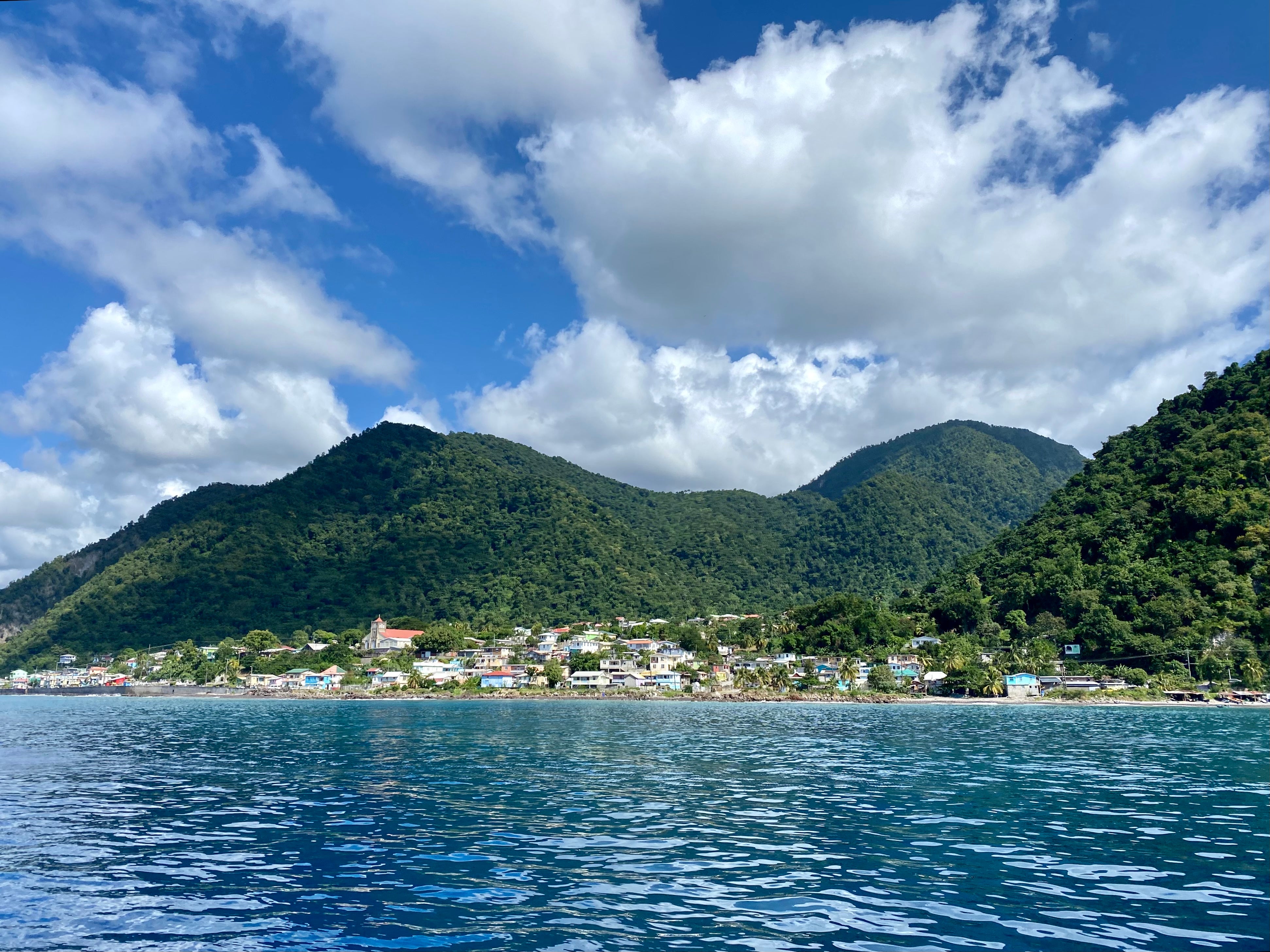
No international airport, no hotel chains or white sand beaches, sparse roads, hardly any street lights... I find the island of Dominica blissfully free of urban sprawl. What the place nicknamed the Caribbean’s “nature island” does have in abundance is wilderness. A thickly rainforested, mountainous interior, to be exact, fringed by beaches of black and silver volcanic sand. It hides nine active volcanos and so many waterfalls and rivers that locals like to say you could hike to see a new one every day of the year. The island wobbles on top of a crust of geothermal activity that creates a boiling lake, natural hot springs and underwater volcanic geysers, which have been burbling away seemingly since the dawn of time.
Dominica (pronounced Domin-ee-ca) is far too often confused with the Dominican Republic, another Caribbean island 1,000km (621 miles) away. When I arrive in late autumn, I find it very much its own place: a verdant, English-speaking nation sandwiched between francophone Martinique and Guadeloupe. Its residents are still working to repair the devastating effects of Hurricane Maria, which ripped through here in 2017, destroying 90 per cent of the island’s infrastructure and tragically killing five people.
But this tiny island – one of the poorest in the Caribbean – is also on track to become the world’s first “climate-resilient” nation: constructing weatherproof buildings and a safe housing initiative, reinvesting in sustainable agriculture and working to attract ecologically-minded travellers with a green tourism pass scheme that offers entry to the many wonders of its national parks.
Dominica was christened when Christopher Columbus set foot on its shores one Sunday back in 1493, but the Kalinago people had been here for centuries before him, and are still here today, some 3,400 of them. The Kalinago (the term “Carib Indian” was imposed by Europe; Kalinago is their term) already had their own name for Dominica – Waitukubuli, which means “tall is her body”, for the mountains that tower over their cluster of coastal villages in the east of the island. The community’s cultural centre now offers hiking tours, cultural experiences and homestays, the perfect antidote to the cookie-cutter resort life found so often on other Caribbean islands.
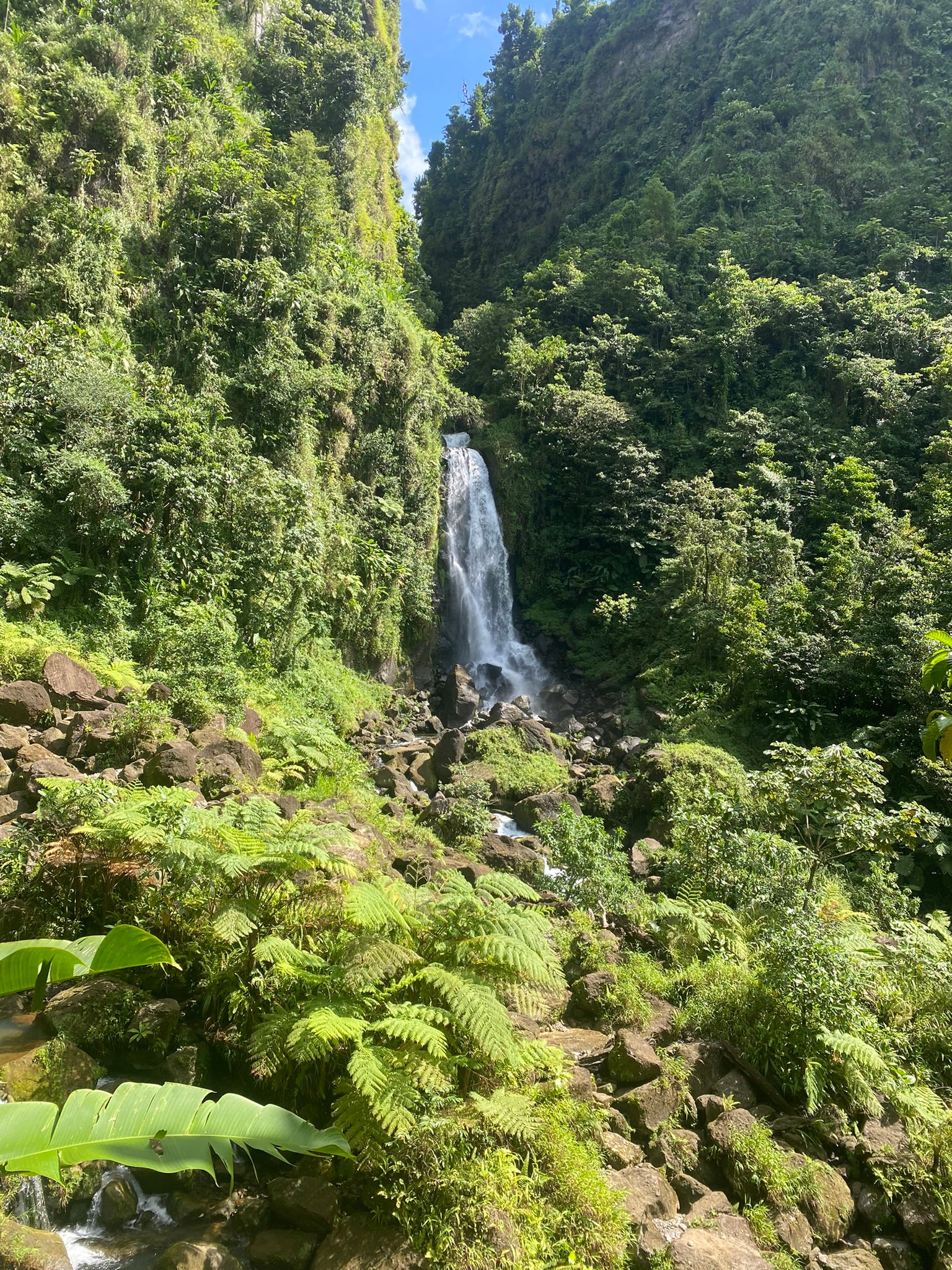
Another place to feel the ebb and flow of island life is ever-busy Roseau, Dominica’s rainbow-painted capital. It’s easily explored on foot. I walked among packed craft markets, explored the town’s lush green botanical garden and stopped at fast-food joints selling piping-hot Jamaican patties before ending up at the Hi-Rise, a beachfront bar where the owner enthusiastically made me try her signature – and incredibly potent – rum punch.
This tiny island is on track to become the world’s first climate-resilient nation
You only have to wander through the town’s Saturday farmers’ market to appreciate Dominica’s wild bounty. Stalls groan under the weight of everything from just-picked mangoes to fragrant tonka beans and hand-woven homewares. The only blots on the landscape are the enormous cruise ships that dock here from December to April, belching fumes and towering over Roseau. But my hiking guide tells me that the locals welcome cruise visitors with open arms, since they venture onto land to buy handmade crafts, hire guides and spend money in the town’s restaurants.
The very best places to eat on the island are typically low key: Dominica’s roadside shacks. French bakery meets Caribbean barbecue at the Madiba Beach Café, while the Islet Views shack’s “bush rums” are legendary. But half the fun is driving mountain roads or wandering on coast paths and picking at random – just look for neon-painted wooden bars serving up delicacies such as goat curry or callaloo (amaranth leaf soup), as well as eye-wateringly strong peanut punch.
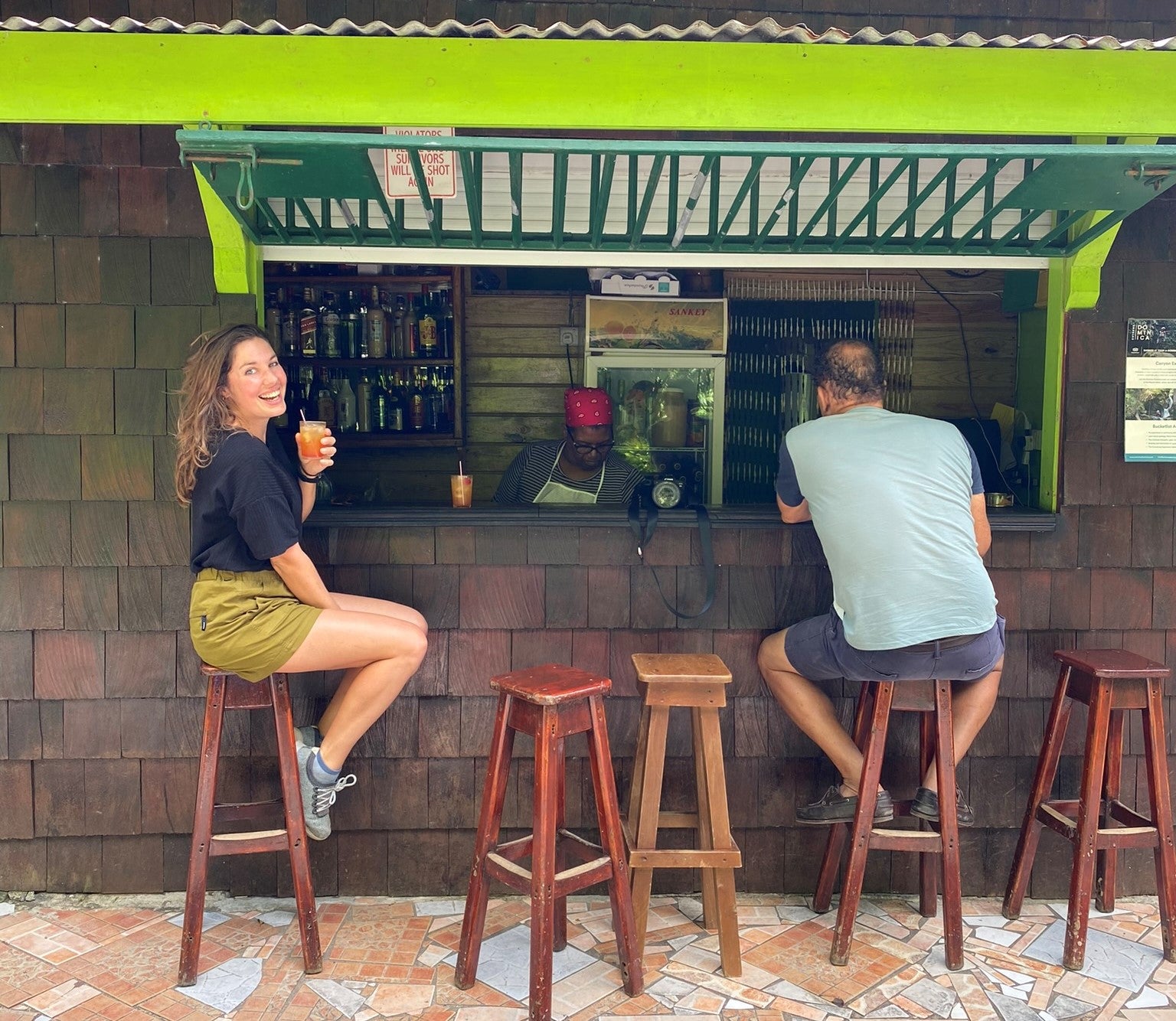
It’s far easier to pop into and support small businesses here than on other islands I’ve visited. Another mom-and-pop operation to seek out is the island’s scattering of hot spring pools. A far cry from luxury spas, most are small gardens containing inviting, steaming pools, with entry for an afternoon soak costing around £8. Found down a dirt lane in the village of Wotten Waven, we came upon Ti Kwen Glo Cho, which means “little corner of hot water” in Creole.
A necklace of steaming hot sulphur pools is strung along different levels of a local family’s flower-strewn backyard, alongside tin baths to wallow in and an ice-cold shower for the brave. The water may be the colour of builder’s tea and smell slightly of eggs – that’s the sulphur, which we’re told softens the skin and eases eczema – but it’s wonderfully warm. We float happily among bright hibiscus and heliconia flowers, our skin turning a matching shade of pink.
Another mom-and-pop operation to seek out is the island’s scattering of hot spring pools: a far cry from luxury spas
Keen for more adventure, we decide to hike the newly opened 114-mile-long Waitukubuli National Trail, which weaves through the rainforest, crossing the island from north to south. If you haven’t got time to tackle the two-week trek, stroll a section of it at Cabrits National Park, where the trail ends in the north. You could also take the 13.5-mile round trip to reach the Boiling Lake in Trois Pitons National Park to the south, a huge lagoon that bubbles and steams at up to 93C (you’ll need a local guide to make sure you don’t quite literally get into hot water).
Back at sea level, we find that plunging under the waves here is just as rewarding as exploring up in the hills. We dip underwater with a guide from Fort Young Hotel’s diving centre in Roseau, where I strap on an oxygen tank and jump into the Champagne Reef. As beautiful a spot as the name hints, volcanic gas rising from seabed fumaroles really does make it feel like you’re snorkelling in a glass of good bubbly (albeit one that’s populated with parrotfish, bright sponges and Hawksbill turtles).
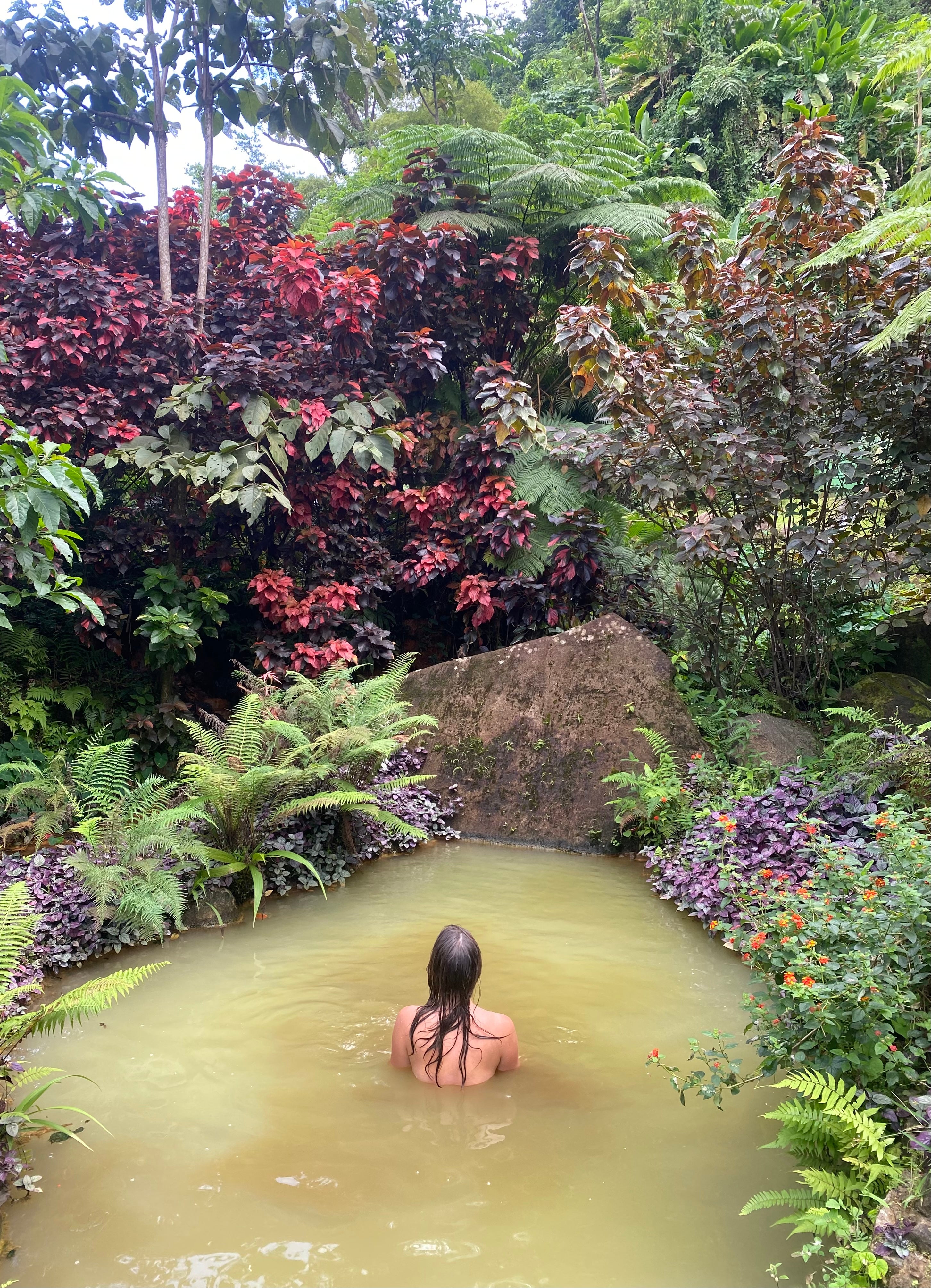
As peaceful and pure as we find Dominica, it’s clear that change is coming. After the hurricane, locals adopted the slogan “Dominica strong”, and as well as grassroots initiatives there are now plans for an international airport and sprawling resorts aiming to strengthen the economy. But for now, at least, the island is a paradise found – and one calling out for adventurous visitors. Tall is her body, hot are her corners of spring water; the “nature island” deserves all the plaudits she receives for her beauty, and more.
How to do it
A Dominica eco-tourism site user pass costs £4 for one site visit and £10 for unlimited entry to all sites for one week. discoverdominica.com
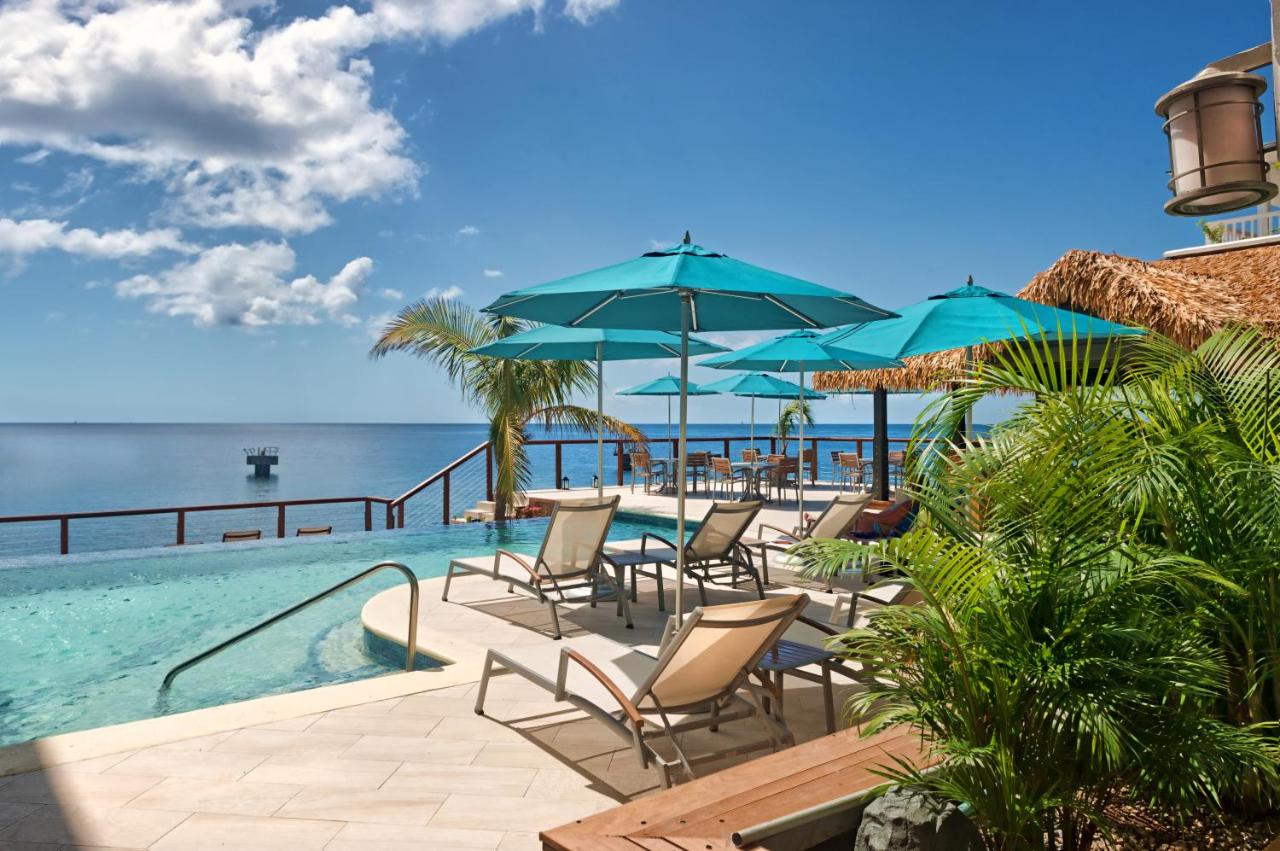
Where to stay
A scuba lover’s delight, comfortable Fort Young Hotel boasts its own on-site diving school. Built on the location of an old military fort overlooking the ocean, the hotel is on the edge of Roseau, for easy town exploring. Doubles from £283.
Award-winning off-grid lodge with cottages, a bunkroom and camping, and complete with a back-garden river pool to kayak or dip in. Doubles from £41.
The Kalinago people offer overnight stays in simple cottages as part of guided hikes and cultural visits. Book via responsibletravel.com. Doubles from £37.
A welcoming little guesthouse close to Wotten Waven’s hot springs, run by Ophelia Marie, one of Dominica’s most prominent singers of Creole music. Doubles from £67.
For a night or two of opulence, hole up in one of Secret Bay’s romantic rainforest treehouses, perched on the northern cliffs of the island. If it’s good enough for Mick Jagger... Doubles from £805.
Join our commenting forum
Join thought-provoking conversations, follow other Independent readers and see their replies
Comments
Bookmark popover
Removed from bookmarks